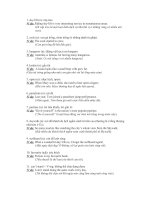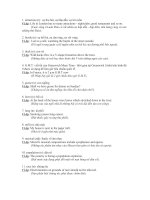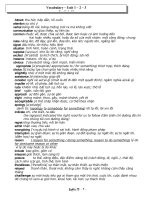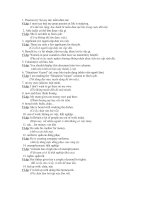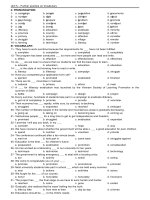Assessing Vocabulary
Bạn đang xem bản rút gọn của tài liệu. Xem và tải ngay bản đầy đủ của tài liệu tại đây (145.59 KB, 52 trang )
1
Assessment of
Vocabulary
Helen Huntley
Senior English Language Fellow 2007-08
MOET, Vietnam
/>
2
Workshop Explorations
What is a word?
Does vocabulary consist of single words or as
larger lexical items?
What does it mean to know a lexical item?
What should be measured in a vocabulary
test?
How should vocabulary be measured?
What is better – discrete-item testing or
contextualized-item testing?
And more…
3
Questions to Ponder
How is vocabulary tested in the school
graduation and university entrance
tests?
How are the words chosen for inclusion
in the test?
What features of a word are being
tested?
4
What is a word?
Single words: chair
Phrasal verbs: put on
Short phrases: as a matter of fact
Longer phrases: it has come to my
attention that…
idioms: out to lunch
5
Larger lexical items
Phrasal verbs
move out, put up with, put off
Compound nouns
personal computer, Applied Linguistics
Idioms
let the cat out of the bag, raining cats and dogs
Collocations
a piercing scream, analyze data
Lexical phrases
6
Lexical phrases
Polywords: short fixed phrases
at any rate, so to speak, as a matter of fact
Institutionalized expressions: proverbs, formulaic
utterances
once upon a time, long time no see
Semi-fixed expressions: basic frame + options
a day/month/year ago, yours sincerely/truly, as far as I
know/can tell/ am aware
Sentence builders: framework for complete sentence with
slots for whole ideas
I think that…, not only… but also…, I regret to inform you
that…
7
More lexical phrases
I thought you’d never ask.
Call me as soon as you get home.
It’s on the tip of my tongue.
Have you heard the news?
Never say never.
I’ll believe it when I see it.
She never has a bad word to say about
anyone
8
Characteristics of lexical
sequences
Relatively fixed in form
The meanings of the individual words do
not provide the meaning for the phrase
Familiar expressions for everyday
communication
Pragmatic function
9
Components of word knowledge
I: Form: (Nation, 1990: 31)
Spoken Form
(R) What does the word sound like?
(P) How is the word pronounced?
Written Form
(R) What does the word look like?
(P) How is the word written and spelled?
10
Components of word knowledge
II: Position (Nation, 1990: 31)
Grammatical Patterns
(R) In what patterns does the word occur?
(P) In what patterns must we use the word?
Collocations
(R) What words or types of words can be
expected before or after the word?
(P) What words or types of words must we use
with this word?
11
Components of word knowledge III:
Function (Nation, 1990: 31)
Frequency
(R) How common is the word?
(P) how often should the word be used?
Appropriateness
(R) where would we expect to meet this
word?
(P) Where can this word be used?
12
Components of word knowledge IV:
Meaning (Nation, 1990: 31)
Concept
(R) What does the word mean?
(P) What word should be used to express this
meaning?
Associations
(R) What other words does this word make us
think of?
(P) What other words does this word make us
use instead of this one?
13
Four stages of knowing a word
Stage 1: I never saw it before.
Stage 2: I’ve heard of it, but I don’t know what it
means.
Stage 3: I recognize it in context – it has
something to do with…
Stage 4: I know it.
(Stage 5: I can distinguish this word from others that are closely
related to it.)
Dale (1965: 898)
14
What is vocabulary ability?
The context of vocabulary use
generational usage
language variations
everyday usage/specialized terminology
Vocabulary knowledge and fundamental processes
vocabulary size
knowledge of word characteristics
lexical storage
fundamental vocabulary processes
Metacognitive stategies for vocabulary use
strategic competence (paraphrazing, avoiding, language
switching, appealing to authority, using general terms)
15
Objective testing of vocabulary
“Tests in which the learning material is divided into small
units, each of which can be assessed by means of a
test item with a single correct answer that can be
specified in advance.”
Reed, J. (2000). Assessing vocabulary. Cambridge University Press
Words treated as independent linguistic units >
multiple-choice, matching test, discrete item testing
etc.
Tests often based on word lists of frequency
Multiple-choice tests discriminate well among levels of
ability and are highly reliable
Valid indicators of overall language ability
16
Multiple-choice vocabulary items
Little ongoing research available, except for TOEFL
Difficult to construct; require field-testing, analysis, refinement
Learner may know an alternate meaning of the word, but not the
one sought
25% chance of guessing correctly
Items may test knowledge of distractors instead of exact
meaning of target word
Wrong answer may result from lack of understanding of syntax
Permits only limited sampling of total vocabulary knowledge
Weshe & Paribakht (1996: 17).
BUT: convenient to administer; well-established procedures to
analyze them
17
Matching items
Next to each word, write the letter of its meaning.
1. a region
2. physical
3. cells
4. oxygen
5. to evaporate
related to the body
gas that we breathe
a part of a country
smallest parts of living
things
useful liquid
to change into steam
exciting event
18
Matching items
Next to each word, write the number of its meaning.
1. Region ____
2. Status ____
3. Cell ____
4. Oxygen ____
5. Skeleton ____
a. Position in relation to
others
b. Gas that we breathe
c. Part of a country
d. Smallest part of living
things
e. Useful liquid
f. Set of bones in the
body
g. Exciting event
19
Matching format
Find the word which fits in each sentence
and write it in the blank at the end.
1. Someone who is not worried about
life is _____.
2. A metal that is not processed is
_____
3. An illness that never gets better is
_____
4. Clothes that fit close to your body are
_____
5. Someone who hits other people hard
is _____
a. violent
b. secure
c. crude
d. hostile
e. tight
f. chronic
g. parallel
20
Blank-filling/completion
Write one suitable word in each blank.
a. Modern planes fly at an a__________ of
35,000 feet.
b. Many diamond mines are l_________ in
South Africa.
c. Near the Equator, there is not much
seasonal v_________ in temperature.
21
Multiple-choice matching
Last week while Jack and Linda were having
lunch in a café, thieves (1)broke down the front
door of their house, went inside, and (2)broke
into their safe. Now they’re (3)broke.
_____ a. poor
_____ b. made into two or more pieces
_____ c. entered to steal something
_____ d. entered by force
22
Assessing quality of vocabulary
knowledge
Little research available on in-depth study
of word-knowledge, except in young
children
BUT: proposals to recognize
Partial vs. precise knowledge
Depth of knowledge
Receptive vs. productive knowledge
23
Sentence-writing
Write a sentence to show you know what
the word means and how it is used.
a. vegetation
b. involve
c. twist
d. starve
e. principal
24
Testing depth of processing
TO INTERPRET
1. Write two sentences: A and B. In each sentence, use the two
words given.
A. interpret experiment
B. interpret language
2. Write three words than can fit in the blank.
to interpret a(n) i __________
ii __________
iii __________
3. Write the correct ending for each word:
a. Someone who interprets is an interpret____.
b. Something that can be interpreted is interpret_____.
c. Someone who interprets gives an interpret_____.
25
Cloze tests
Used for assessment of overall language
proficiency, reading, and vocabulary
Fixed ratio (every 7
th
word)
Selective-deletion (rational)
Multiple-choice
C-test
How to separate out vocabulary from other
skills?


